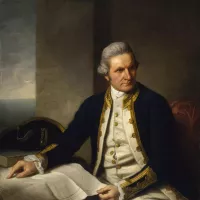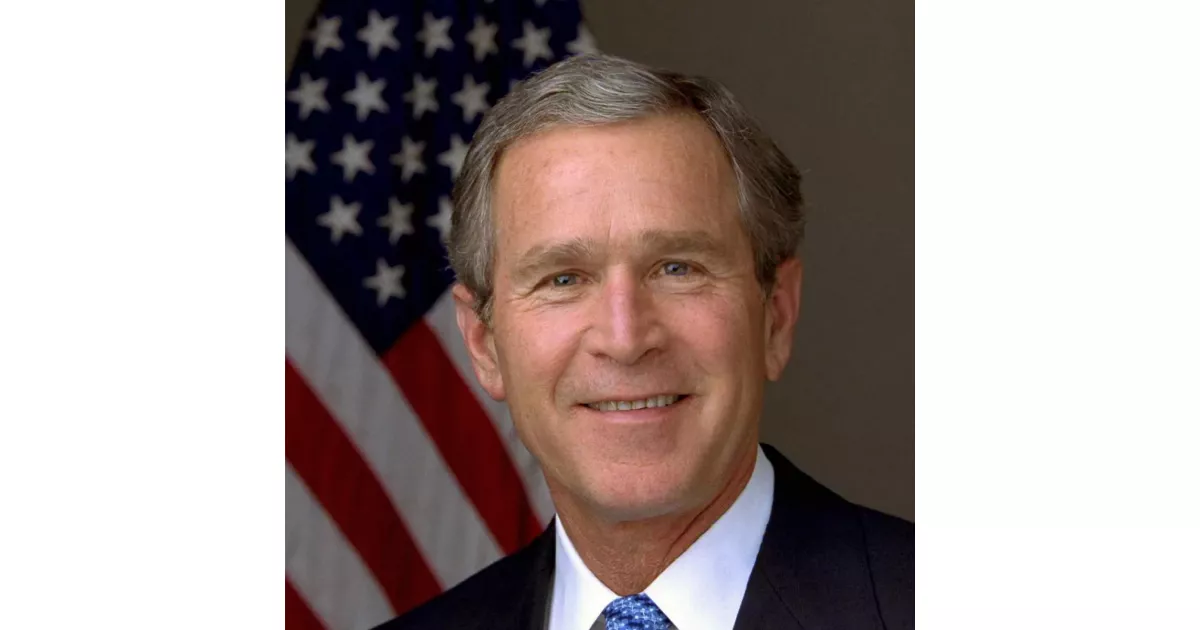George W. Bush, the 43rd U.S. President (2001-2009), is a Republican politician, businessman, and former U.S. Air Force officer. The son of President George H.W. Bush, he previously served as the 46th Governor of Texas (1995-2000). His presidency was largely defined by the September 11th terrorist attacks in 2001, which led to the launch of the War on Terror, including military interventions in Afghanistan and Iraq. Domestically, he enacted education reform legislation known as No Child Left Behind and signed tax cuts into law. His administration also faced criticism for its handling of Hurricane Katrina and the 2008 financial crisis.
1935: Mahon Held the District
In 1935, George H. Mahon started to hold the Texas's 19th congressional district.
July 6, 1946: George W. Bush's Birth
On July 6, 1946, George Walker Bush was born in New Haven, Connecticut, the first child of George Herbert Walker Bush and Barbara Pierce.
1953: Death of Sister Robin
In 1953, George W. Bush's younger sister, Robin, died from leukemia at the age of three.
1964: Attended Yale University
In 1964, George W. Bush began attending Yale University.
1967: Engagement to Cathryn Lee Wolfman
In 1967, George W. Bush was engaged to Cathryn Lee Wolfman, but the engagement did not last.
May 1968: Joined the United States Air Force
In May 1968, George W. Bush joined the United States Air Force and was commissioned into the Texas Air National Guard.
1968: Graduated from Yale University
In 1968, George W. Bush graduated from Yale University with a Bachelor of Arts degree in history.
1972: Suspended from Flying
In 1972, George W. Bush was suspended from flying for failure to take a scheduled physical exam.
1973: Drilled with Alabama Air National Guard
In late 1972 and early 1973, George W. Bush drilled with the 187th Fighter Wing of the Alabama Air National Guard while working on Winton M. Blount's Senate campaign.
1973: Entered Harvard Business School
In the fall of 1973, George W. Bush entered Harvard Business School.
November 21, 1974: Honorably Discharged from Air Force Reserve
On November 21, 1974, George W. Bush was honorably discharged from the Air Force Reserve.
1975: Graduated from Harvard Business School
In 1975, George W. Bush graduated from Harvard Business School with an M.B.A. degree, becoming the only U.S. president to have earned the degree.
September 4, 1976: Arrested for Driving Under the Influence
On September 4, 1976, George W. Bush was arrested for driving under the influence of alcohol in Kennebunkport, Maine.
1977: Established Arbusto Energy
In 1977, George W. Bush established Arbusto Energy, a small oil exploration company.
1977: Met and Married Laura Welch
In 1977, George W. Bush met Laura Welch, a schoolteacher and librarian, and they married on November 5 after a three-month courtship.
1978: Ran for U.S. House of Representatives
In 1978, George W. Bush ran for the U.S. House of Representatives from Texas's 19th congressional district but lost the election to Kent Hance.
1978: Arbusto Energy Operations Began
In 1978, operations began at George W. Bush's oil exploration company, Arbusto Energy.
November 25, 1981: Birth of Twin Daughters
On November 25, 1981, Laura Bush gave birth to fraternal twin daughters, Barbara and Jenna.
1981: Father Becomes Vice President
In 1981, George W. Bush's father, George H.W. Bush, became Ronald Reagan's Vice President.
1984: Merger with Spectrum 7
In 1984, George W. Bush's company, Bush Exploration, merged with Spectrum 7, and Bush became chairman.
1986: Gave Up Alcohol
In 1986, George W. Bush attributes his decision to give up alcohol to the influence of his wife, Laura.
1988: Moved to Washington, D.C.
In 1988, George W. Bush and his family moved to Washington, D.C., to work on his father's campaign for the U.S. presidency.
April 1989: Arranged Purchase of Texas Rangers
In April 1989, George W. Bush arranged for a group of investors to purchase a controlling interest in the Texas Rangers Major League Baseball team.
1989: Father Becomes 41st U.S. President
In 1989, George W. Bush's father became the 41st U.S. President.
December 1991: Named Advisor to Father's Re-Election Campaign
In December 1991, George W. Bush was named as one of the advisors to his father's 1992 presidential re-election campaign.
1991: Continued Presence of U.S. Troops in Saudi Arabia
The continued presence of U.S. troops in Saudi Arabia after the 1991 Gulf War was one of the stated motivations behind the September 11 attacks.
1992: Father's Re-Election Campaign
In 1992, George W. Bush was one of seven people named by his father to run his father's 1992 presidential re-election campaign as a campaign advisor.
1993: End of Father's Presidency
In 1993, George H.W. Bush's presidency came to an end.
1994: Candidacy for Texas Gubernatorial Election
In 1994, George W. Bush declared his candidacy for the Texas gubernatorial election.
1995: Passage of Dickey-Wicker Amendment
Federal funding for medical research involving the creation or destruction of human embryos through the Department of Health and Human Services and the National Institutes of Health has been forbidden by law since the passage of the Dickey–Wicker Amendment in 1995.
1997: Senate Disapproval of the Kyoto Protocol
In 1997, the Senate voted 95–0 on a resolution expressing its disapproval of the Kyoto Protocol.
1998: Won Re-election as Governor
In 1998, George W. Bush won re-election as governor of Texas with a record 68 percent of the vote.
1998: Sale of Texas Rangers Shares
In 1998, George W. Bush's sale of his shares in the Texas Rangers brought him over $15 million from his initial investment.
1998: Clinton's Response to India after Nuclear Tests
President Bush's visit to India in March 2006 starkly contrasted with decades of U.S. policy, such as the stance taken by his predecessor, Bill Clinton, whose approach and response to India after the 1998 nuclear tests has been characterized as "sanctions and hectoring".
1999: Signed Law Promoting Renewable Energy
In 1999, George W. Bush signed a law requiring electric retailers to buy a certain amount of energy from renewable sources, which helped Texas become a leading producer of wind power.
June 10, 2000: Proclaimed Jesus Day in Texas
On June 10, 2000, George W. Bush proclaimed Jesus Day in Texas.
July 25, 2000: Bush selects Dick Cheney as running mate
On July 25, 2000, George W. Bush selected Dick Cheney as his running mate for the upcoming presidential election. At the time, Cheney was the head of Bush's vice presidential search committee.
2000: Campaigning for President
In 2000, George W. Bush campaigned for President, portraying himself as a compassionate conservative.
2000: Won the Presidential Election
In 2000, George W. Bush won the presidential election against Al Gore, despite losing the popular vote and a Supreme Court decision halting a recount in Florida.
2000: End of Bush's Governorship
In 2000, George W. Bush's term as the governor of Texas came to an end.
2000: Time names Bush Person of the Year
In 2000, Time magazine named George W. Bush as its Person of the Year, a title awarded to someone who the editors believe "has done the most to influence the events of the year".
2000: Federal Government Spending and Revenues in 2000
In 2000, federal government spending was $1.789 trillion and revenues were $2.025 trillion.
2000: Poverty Rate in 2000
In 2000, the poverty rate was 11.3%.
2000: Fiscal Year 2000 Surplus
In fiscal year 2000, the U.S. had a surplus of $237 billion, the third consecutive and largest surplus ever.
2000: Immigration to the U.S.
Nearly eight million immigrants came to the U.S. from 2000.
2000: Speculation about Presidential Candidacy
Throughout George W. Bush's first term as governor, he was the focus of national attention as a potential future presidential candidate; following his re-election in 1998, speculation soared, and within a year he decided to seek the 2000 Republican presidential nomination.
January 2001: Unemployment Rate in January 2001
In January 2001, the unemployment rate was 4.2%.
February 7, 2001: Shots fired at the White House
On February 7, 2001, while George W. Bush was in the White House residence, Robert W. Pickett fired a number of shots from a Taurus .38 Special revolver towards the White House. Pickett was apprehended and charged with firearms violations and assaulting a federal officer.
April 2001: Hainan Island Incident
In April 2001, George W. Bush expressed U.S. support for the defense of Taiwan following the stand-off with China over the Hainan Island incident, where a U.S. surveillance aircraft collided with a People's Liberation Army Air Force jet, leading to the detention of U.S. personnel.
May 2001: Executive Orders on Energy and Environment
In May 2001, George W. Bush signed an executive order to create an interagency task force to streamline energy projects, and later signed two other executive orders to tackle environmental issues.
August 9, 2001: Executive Order on Stem Cell Research Funding
On August 9, 2001, President Bush signed an executive order that lifted the ban on federal funding for research on the existing 71 "lines" of stem cells. However, the ability of these existing lines to provide an adequate medium for testing has been questioned.
September 11, 2001: September 11th Terrorist Attacks
On September 11, 2001, terrorist attacks reshaped George W. Bush's administration, leading to the War on Terror and the creation of the Department of Homeland Security.
October 7, 2001: Initiation of Bombing Campaigns in Afghanistan
On October 7, 2001, U.S. and British forces initiated bombing campaigns in Afghanistan, leading to the arrival of Northern Alliance troops in Kabul on November 13. The main goals of the war were to defeat the Taliban and drive al-Qaeda out of Afghanistan.
December 2001: Osama bin Laden Escapes in Tora Bora
In December 2001, al-Qaeda leader Osama bin Laden escaped a battle in the mountainous region of Tora Bora. The Bush Administration later acknowledged that this resulted from a failure to commit enough U.S. ground troops.
December 2001: Taliban Defeat Reported, Continued War Cautioned
In December 2001, the Pentagon reported that the Taliban had been defeated in Afghanistan, but cautioned that the war would continue to weaken Taliban and al-Qaeda leaders. Later that month, the UN installed the Afghan Transitional Administration chaired by Hamid Karzai.
2001: Beginning of Condoleezza Rice's Tenure as National Security Advisor
In 2001, Condoleezza Rice began her tenure as George W. Bush's National Security Advisor, serving until 2005.
2001: Bush Becomes President
In 2001, George W. Bush became the 43rd president of the United States.
2001: Bush's Tax Cut Plan and Economic Concerns
In 2001, George W. Bush proposed a $1.35 trillion tax cut program, arguing that the surplus was the people's money. Federal Reserve chairman Alan Greenspan warned of a recession, while Treasury Secretary Paul H. O'Neill opposed some tax cuts due to concerns about budget deficits and Social Security.
2001: Dow Jones at Start of Bush's Presidency
In 2001, when George W. Bush entered office, the Dow Jones Industrial Average was at 10,587.
2001: Opposition to the Kyoto Protocol
Upon taking office in 2001, George W. Bush stated his opposition to the Kyoto Protocol, citing that the treaty exempted 80% of the world's population and would have cost tens of billions of dollars per year.
January 29, 2002: State of the Union Address and the "Axis of Evil"
In his State of the Union Address on January 29, 2002, President Bush asserted that an "axis of evil" consisting of North Korea, Iran, and Ba'athist Iraq was "arming to threaten the peace of the world".
November 2002: UN Weapons Inspectors in Iraq
In November 2002, Hans Blix and Mohamed ElBaradei led UN weapons inspectors in Iraq, but were advised by the U.S. to depart the country four days prior to the U.S. invasion, despite their requests for more time to complete their tasks.
2002: Proposal of the Clear Skies Act of 2003
In 2002, George W. Bush proposed the Clear Skies Act of 2003, which aimed at amending the Clean Air Act to reduce air pollution through emissions trading programs.
2002: Withdrawal from Anti-Ballistic Missile Treaty
In 2002, George W. Bush withdrew U.S. support for the Anti-Ballistic Missile Treaty (ABM) with Russia, marking the first time the U.S. had withdrawn from a major international arms treaty in post-World War II history. Vladimir Putin, the Russian president, stated that this American withdrawal from the ABM Treaty was a mistake.
2002: No Child Left Behind Act Signed into Law
In early 2002, George W. Bush signed the No Child Left Behind Act into law, which aimed to measure and close the gap between rich and poor student performance, provide options to parents with students in low-performing schools, and target more federal funding to low-income schools.
January 2003: State of the Union address: PEPFAR outlined
In January 2003, George W. Bush announced a five-year strategy for global emergency AIDS relief, known as the President's Emergency Plan for AIDS Relief (PEPFAR), during the State of the Union address. Bush pledged $15 billion for the initiative.
March 20, 2003: Invasion of Iraq
On March 20, 2003, the United States, along with the "coalition of the willing", initiated the invasion of Iraq. The Iraqi military was quickly defeated.
April 9, 2003: Fall of Baghdad
On April 9, 2003, Baghdad, the capital of Iraq, fell to U.S. forces during the invasion of Iraq.
June 2003: Unemployment Rate in June 2003
In June 2003, the unemployment rate rose to 6.3%.
2003: Initiation of President's Emergency Plan and Invasion of Iraq
In 2003, George W. Bush initiated the President's Emergency Plan for AIDS Relief and ordered the invasion of Iraq, based on the false belief that Saddam Hussein's regime possessed weapons of mass destruction.
2003: Medicare Act of 2003 Signed into Law
In 2003, George W. Bush signed the Medicare Act of 2003, which included major changes to the Medicare program by providing beneficiaries with assistance in paying for prescription drugs and relying on private insurance for the delivery of benefits.
2003: Another Tax Cut Passed
In 2003, another tax cut was passed as the economy showed signs of improvement, though job growth remained stagnant.
2003: Bush Administration Pushed for Increased Regulation of Fannie Mae and Freddie Mac
In 2003, the Bush administration pushed for increased regulation of Fannie Mae and Freddie Mac. The regulations passed the House but died in the Senate.
2003: Clear Skies Act Failed to Pass
In 2003, the Clear Skies Act failed to make it out of committee in Congress.
2003: Withdrawal of U.S. Troops from Saudi Arabia
In 2003, the U.S. withdrew most of its troops from Saudi Arabia.
May 2004: High approval rating among Republicans
In May 2004, a Gallup poll indicated that 89 percent of the Republican electorate approved of George W. Bush.
December 2004: Approval rating falls below 50 percent
In December 2004, George W. Bush's approval rating fell below 50 percent in AP-Ipsos polling. Afterwards, approval ratings for his handling of domestic and foreign policy steadily declined.
2004: Strong support from military in election
In 2004, 73 percent of U.S. military personnel indicated they would vote for George W. Bush, while 18 percent preferred John Kerry. Peter Feaver suggested military members supported Bush due to his commitment to completing the War in Iraq.
2004: Bush's Re-election Campaign
In 2004, George W. Bush campaigned for re-election with broad Republican support. He emphasized commitment to the wars in Iraq and Afghanistan, support for the USA PATRIOT Act, constitutional amendments banning abortion and same-sex marriage, reforming Social Security, creating an ownership society, and opposing mandatory carbon emissions controls. He also proposed a guest worker program for immigrants.
2004: Bush Re-elected as President
In 2004, George W. Bush was re-elected as president, defeating John Kerry.
2004: Nomination of Porter Goss and CIA Purge
In 2004, following the resignation of CIA director George Tenet, George W. Bush nominated Porter Goss to head the agency. The White House ordered Goss to purge agency officers who were disloyal to the administration, leading to the firing or resignation of many senior CIA agents. The CIA was also accused of leaking classified information to undermine the 2004 election.
2004: Poverty Rate Peak in 2004
In 2004, the poverty rate peaked at 12.7%.
January 2005: Iraqi Elections
In January 2005, Iraq held elections recognized by the West as free and fair for the first time in 50 years, leading to the election of Jalal Talabani as president and Nouri al-Maliki as Prime Minister of Iraq.
May 10, 2005: Grenade thrown at Bush during speech
On May 10, 2005, during a speech in Freedom Square, Vladimir Arutyunian threw a live Soviet-made RGD-5 hand grenade toward the podium where George W. Bush was speaking. The grenade landed in the crowd but did not detonate.
June 2005: Release of Air National Guard Records
In June 2005, the Department of Defense released all records of George W. Bush's Texas Air National Guard service.
July 2005: Arutyunian arrested
In July 2005, Vladimir Arutyunian, who threw a grenade at George W. Bush on May 10, was arrested. During the arrest, he killed an Interior Ministry agent.
July 19, 2005: Bush nominates John Roberts to Supreme Court
On July 19, 2005, George W. Bush nominated federal appellate judge John Roberts to replace Associate Justice Sandra Day O'Connor, who had retired on July 1.
September 29, 2005: Roberts confirmed as Chief Justice
On September 29, 2005, John Roberts was confirmed by the Senate as the next Chief Justice of the United States, after Bush withdrew his nomination as O'Connor's replacement following the death of Chief Justice William Rehnquist.
October 3, 2005: Bush nominates Harriet Miers to Supreme Court
On October 3, 2005, George W. Bush nominated White House Counsel Harriet Miers to succeed Sandra Day O'Connor as Associate Justice of the Supreme Court.
October 2005: Referendum on Iraqi Constitution
In October 2005, a referendum was held in Iraq to approve a new constitution, supported by most Shiites and many Kurds.
November 1, 2005: Launch of National Strategy for Pandemic Influenza
On November 1, 2005, George W. Bush launched a National Strategy for Pandemic Influenza.
December 2005: Bush's highest approval rating since December 2005
In December 2005, George W. Bush had achieved his highest approval rating since then, according to polls conducted in April 2013
2005: Condoleezza Rice Becomes Secretary of State
In 2005, Condoleezza Rice became George W. Bush's Secretary of State, serving until 2009.
2005: Campaigning for Social Security Reform
In 2005, George W. Bush embarked on a national tour, campaigning for his Social Security reform initiative in media events known as "Conversations on Social Security." However, public support declined, and the proposal's legislative prospects were further diminished by political fallout from the response to Hurricane Katrina.
2005: Social Security Reform Initiative
In 2005, George W. Bush outlined a major initiative to reform Social Security, which included partial privatization of the system and personal Social Security accounts. He discussed the potential impending bankruptcy of the program in his 2005 State of the Union Address.
2005: Hurricane Katrina Devastates the Gulf Coast
In 2005, Hurricane Katrina, one of the most damaging natural disasters in U.S. history, devastated much of the north-central Gulf Coast of the United States, particularly New Orleans.
2005: Immigration to the U.S.
Nearly eight million immigrants came to the U.S. from 2005, more than in any other five-year period in the nation's history.
2005: Failure of Operation Red Wings
The 2005 failure of Operation Red Wings showed that the Taliban had returned.
January 2006: Arutyunian convicted and sentenced
In January 2006, Vladimir Arutyunian was convicted for throwing a grenade at George W. Bush in May 2005 and was sentenced to life in prison.
January 31, 2006: Alito confirmed to Supreme Court
On January 31, 2006, Samuel Alito was confirmed by the Senate to replace Sandra Day O'Connor as Associate Justice of the Supreme Court, after Harriet Miers withdrew her nomination.
March 2006: Bush Visits India Focusing on Nuclear Energy and Counter-Terrorism
In March 2006, President Bush visited India, focusing on nuclear energy, counter-terrorism cooperation, and discussions that would eventually lead to the India–United States Civil Nuclear Agreement.
March 2006: Barack Obama on Raising the Debt Ceiling in March 2006
In March 2006, then-senator Barack Obama criticized raising America's debt limit as a sign of leadership failure.
May 2006: Publication of Pandemic Influenza Implementation Plan
In May 2006, the Homeland Security Council published an implementation plan for the National Strategy for Pandemic Influenza.
July 19, 2006: First Presidential Veto: Stem Cell Research Enhancement Act
On July 19, 2006, President Bush used his veto power for the first time in his presidency to veto the Stem Cell Research Enhancement Act. The bill would have repealed the Dickey–Wicker Amendment, thereby permitting federal money to be used for research where stem cells are derived from the destruction of an embryo.
August 2006: NSA Surveillance Program Ruled Unconstitutional
In August 2006, a U.S. district court judge ruled that the NSA electronic surveillance program was unconstitutional.
October 9, 2006: North Korea's Nuclear Detonation
On October 9, 2006, North Korea's detonation of a nuclear device complicated President Bush's foreign policy.
October 17, 2006: Signing of Military Commissions Act
On October 17, 2006, President Bush signed the Military Commissions Act of 2006 into law, allowing the U.S. government to prosecute unlawful enemy combatants by military commission and denying detainees access to habeas corpus while barring torture.
2006: Creation of Papahānaumokuākea Marine National Monument
In 2006, President Bush declared the Northwestern Hawaiian Islands a national monument, creating the largest marine reserve to date. The Papahānaumokuākea Marine National Monument comprises 84 million acres and is home to 7,000 species of fish, birds, and other marine animals.
2006: Bush Urges Congress to Allow Illegal Immigrants to Work in the U.S.
In 2006, President Bush urged Congress to allow more than twelve million illegal immigrants to work in the United States with the creation of a "temporary guest-worker program".
2006: Funding Cut for NIH in 2006
In 2006, funding for the National Institutes of Health (NIH) was cut, the first such cut in 36 years, due to rising inflation.
2006: Unfavorable opinion in most countries
In 2006, surveys found that most respondents in 18 of 21 countries around the world held an unfavorable opinion of George W. Bush, judging his administration as negative for world security.
2006: Democrats regain control of Congress
In 2006, the Democratic Party regained control of Congress in the midterm elections. Polls showed an average of 37 percent approval ratings for George W. Bush, which contributed to the Republican Party's defeat, which Bush himself called a "thumping".
2006: Taliban Insurgency
In 2006, the Taliban insurgency appeared larger, fiercer and better organized than expected, with large-scale allied offensives such as Operation Mountain Thrust attaining limited success.
2006: State of the Union Address: "America is addicted to oil"
In his 2006 State of the Union Address, President Bush declared, "America is addicted to oil" and launched his Advanced Energy Initiative to increase energy development research.
January 10, 2007: Troop Surge in Iraq
On January 10, 2007, President Bush initiated a surge of 21,500 additional troops to Iraq, along with a job program and reconstruction proposals, allocating $1.2 billion for these programs.
January 2007: Troop Surge in Iraq
In January 2007, George W. Bush launched a surge of troops in Iraq.
January 17, 2007: Surveillance Program Subjected to Judicial Oversight
On January 17, 2007, Attorney General Alberto Gonzales informed U.S. Senate leaders that the President would not reauthorize the President's Surveillance Program, but would subject it to judicial oversight.
March 2007: Bush most disliked leader in Arab nations
A March 2007 survey of public opinion in six Arab nations conducted by Zogby International and the University of Maryland found that George W. Bush was the most disliked world leader.
March 2007: Additional Troops to Afghanistan
President Bush commissioned 3,500 additional troops to Afghanistan in March 2007.
May 1, 2007: Veto of Troop Withdrawal Bill
On May 1, 2007, President Bush vetoed a bill that set a deadline for the withdrawal of U.S. troops from Iraq, insisting that a continued U.S. presence was crucial.
May 7, 2007: North Korea Agrees to Shut Down Nuclear Reactors
On May 7, 2007, North Korea agreed to shut down its nuclear reactors immediately pending the release of frozen funds held in a foreign bank account, a result of three-way talks initiated by the United States and China.
June 2007: Enthusiastic welcome in Albania
During a visit to Albania in June 2007, George W. Bush received an enthusiastic welcome, with a huge image of him displayed in Tirana and a local street named after him.
June 2007: Bush Supports Comprehensive Immigration Reform Act of 2007
From May to June 2007, President Bush strongly supported the Comprehensive Immigration Reform Act of 2007, which was written by a bipartisan group of senators with the active participation of the Bush administration. The bill envisioned a legalization program for illegal immigrants, with an eventual path to citizenship.
June 2007: Street in Tirana, Albania, renamed after Bush
In June 2007, a street in Tirana, Albania, was renamed after George W. Bush a few days before his visit, marking the first visit by an American president to Albania.
June 28, 2007: Defeat of Comprehensive Immigration Reform Act in the Senate
On June 28, 2007, the Comprehensive Immigration Reform Act was defeated in the Senate, with a cloture motion failing on a 46–53 vote. President Bush expressed disappointment upon the defeat of one of his signature domestic initiatives.
July 6, 2007: Ruling on NSA Surveillance Program Vacated
On July 6, 2007, the United States Court of Appeals for the Sixth Circuit vacated a U.S. district court judge's ruling that the NSA electronic surveillance program was unconstitutional, on the grounds that the plaintiffs lacked standing.
July 2007: Unemployment Rate in July 2007
In July 2007, the unemployment rate dropped to 4.5%.
September 2, 2007: North Korea Agrees to Dismantle Nuclear Programs
On September 2, 2007, North Korea agreed to disclose and dismantle all its nuclear programs by the end of 2007.
October 2007: Peak of Dow Jones Average
In October 2007, the Dow Jones Industrial Average peaked at over 14,000 during George W. Bush's presidency.
November 2007: Treasury Department Freezes Assets
In November 2007, the Treasury Department, acting under executive orders signed in 2004 and later in 2007 by George W. Bush, froze the assets of two Lebanese and two Syrians, accusing them of activities to "undermine the legitimate political process in Lebanon".
December 2007: Start of Post-World War II Recession
In December 2007, the United States entered the longest post-World War II recession, caused by a housing market correction, a subprime mortgage crisis, and soaring oil prices.
2007: Veto of State Children's Health Insurance Program (SCHIP) Legislation
In 2007, George W. Bush vetoed State Children's Health Insurance Program (SCHIP) legislation, which would have expanded federally funded healthcare benefits to children of some low-income families and was to be funded by an increase in the cigarette tax. Bush viewed the legislation as a move toward socialized health care.
2007: Start of the Post-World War II Recession
In 2007, the United States entered the longest post-World War II recession. This occurred during George W. Bush's presidency, amidst significant domestic debates regarding immigration, healthcare, Social Security, and economic policy. Bush's approval ratings steadily declined during this time.
2007: State of the Union Address: Renewed Pledge on Foreign Oil Reliance
In his 2007 State of the Union Address, President Bush renewed his pledge to work toward diminished reliance on foreign oil by reducing fossil fuel consumption and increasing alternative fuel production.
2007: Bush's approval rating hovers in mid-thirties
Throughout most of 2007, George W. Bush's approval rating hovered in the mid-thirties; the average for his entire second term was 37 percent, according to Gallup.
February 2008: Job Losses in February 2008
In February 2008, 63,000 jobs were lost, marking a five-year record.
March 8, 2008: Veto of Intelligence Oversight Bill
On March 8, 2008, President Bush vetoed H.R. 2082, a bill that would have expanded congressional oversight over the intelligence community and banned the use of waterboarding and other interrogation methods, arguing it would remove a valuable tool in the War on Terror.
March 10, 2008: Congress Files Federal Lawsuit over U.S. Attorney Firings
On March 10, 2008, the Congress filed a federal lawsuit to enforce their issued subpoenas related to whether the Justice Department and the White House were using the U.S. Attorney positions for political advantage.
March 2008: Praise for Iraqi Government's Action
In March 2008, President Bush praised the Iraqi government's "bold decision" to launch the Battle of Basra against the Mahdi Army, calling it "a defining moment in the history of a free Iraq".
April 2008: Disapproval ratings reach record high
In April 2008, George W. Bush's disapproval ratings reached the highest ever recorded for any president in the 70-year history of the Gallup poll, with 69 percent of those polled disapproving of his job performance.
May 21, 2008: Signing of Genetic Information Nondiscrimination Act
On May 21, 2008, George W. Bush signed into law the Genetic Information Nondiscrimination Act, which protects Americans against health insurance and employment discrimination based on genetic information.
June 9, 2008: Articles of impeachment introduced against Bush
On June 9, 2008, Representative Dennis Kucinich introduced 35 articles of impeachment against George W. Bush on the floor of the House of Representatives. However, Speaker Nancy Pelosi declared that impeachment was "off the table".
June 2008: Bush Calls on Congress to Expand Domestic Oil Production
Amid high gasoline prices in June 2008, President Bush stated, "In the long run, the solution is to reduce demand for oil by promoting alternative energy technologies... In the short run, the American economy will continue to rely largely on oil. And that means we need to increase supply, especially here at home. So my administration has repeatedly called on Congress to expand domestic oil production."
July 2008: Withdrawal of American Forces
By July 2008, due to increased stability in Iraq and lowered American troop deaths, President Bush withdrew additional American forces from the country.
July 31, 2008: Court Ruling on Congressional Subpoenas
On July 31, 2008, a United States district court judge ruled that President Bush's top advisers were not immune from congressional subpoenas.
September 2008: Intensification of the 2008 Financial Crisis
In September 2008, the 2008 financial crisis intensified with the Federal takeover of Fannie Mae and Freddie Mac, the bankruptcy of Lehman Brothers, and a federal bailout of American International Group for $85 billion.
October 2008: U.S. National Debt in October 2008
By October 2008, the U.S. national debt had risen to $11.3 trillion.
December 14, 2008: Shoes thrown at Bush during press conference
On December 14, 2008, during a press conference in Baghdad, Iraqi journalist Muntadhar al-Zaidi threw both of his shoes at George W. Bush. Bush was not injured, but White House press secretary Dana Perino was bruised by a microphone boom.
December 2008: Shoe-Throwing Incident in Iraq
During President Bush's last visit to Iraq in December 2008, Iraqi journalist Muntadhar al-Zaidi threw both of his shoes at him during a press conference, yelling that they were a "farewell kiss" for the victims of the war.
2008: Approval rating drops to low of 19 percent
By the beginning of 2008, George W. Bush's final year in office, his approval rating had dropped to a low of just 19 percent, largely from the loss of support among Republicans.
2008: Criticism of Bush's handling of the 2008 financial crisis
Critics often point to George W. Bush's handling of the 2008 financial crisis as proof that he was unfit to be president.
2008: Federal Government Spending and Revenues in 2008
In 2008, federal government spending was $2.983 trillion, and revenues were $2.524 trillion. Individual income tax revenues increased by 14%, corporate tax revenues by 50%, and customs and duties by 40%. Discretionary defense spending increased by 107%, discretionary domestic spending by 62%, Medicare spending by 131%, social security by 51%, and income security spending by 130%.
2008: Financial Crisis and Low Approval Ratings
In 2008, the U.S. entered the Great Recession, contributing to George W. Bush leaving office as one of the most unpopular U.S. presidents.
2008: Dow Jones at End of Bush's Presidency
In 2008, when George W. Bush left office, the Dow Jones Industrial Average was at 7,949, one of the lowest levels of his presidency.
2008: Support for Ukraine and Georgia Joining NATO
In early 2008, President Bush vowed full support for admitting Ukraine and Georgia into NATO despite Russia's opposition to the further enlargement of NATO. During the 2008 Russo-Georgian diplomatic crisis, Bush condemned Russia for recognizing the separatist government of South Ossetia. When Russian troops invaded Georgia later that summer, Bush said: "Bullying and intimidation are not acceptable ways to conduct foreign policy in the 21st century."
2008: Commitment to International Clean Energy Fund
In his 2008 State of the Union Address, President Bush committed $2 billion over the next three years to a new international fund to promote clean energy technologies and fight climate change.
2008: Low approval ratings before election
In the fall of 2008, just before the election, George W. Bush's approval ratings remained at record lows of 19 to 20 percent, while his disapproval ratings ranged from 67 percent to as high as 75 percent.
January 2009: Bush's favorability rating stands at 40 percent
In January 2009, George W. Bush's favorability rating in public opinion surveys stood at 40 percent.
March 2009: First post-presidency speech and Colbert Report appearance
In March 2009, George W. Bush delivered his first post-presidency speech in Calgary, Alberta, appeared via video on The Colbert Report, and attended the funeral of Senator Ted Kennedy.
March 2009: Bush's favorability rating decreases to 35 percent
In March 2009, George W. Bush's favorability rating decreased to 35 percent.
September 15, 2009: Al-Zaidi released from prison
On September 15, 2009, Muntadhar al-Zaidi, who threw his shoes at George W. Bush in December 2008, was released early from prison for good behavior.
November 5, 2009: Visit to Fort Hood shooting survivors
On November 5, 2009, following the Fort Hood shooting, George W. Bush and Laura Bush paid an undisclosed visit to the survivors and the victims' families.
2009: C-SPAN's 2009 survey of historians ranked Bush as the 36th-best president
In 2009 C-SPAN's survey of historians ranked George W. Bush as the 36th-best president.
2009: End of Condoleezza Rice's Tenure as Secretary of State
In 2009, Condoleezza Rice's tenure as George W. Bush's Secretary of State came to an end.
2009: Bush's Presidency Ends
In 2009, George W. Bush's presidency ended.
2009: Final job approval rating
In polling conducted January 9–11, 2009, George W. Bush's final job approval rating by Gallup was 34 percent, which placed him on par with Jimmy Carter and Harry S. Truman.
January 2010: Establishment of Clinton Bush Haiti Fund
In January 2010, at President Obama's request, George W. Bush and Bill Clinton established the Clinton Bush Haiti Fund to raise contributions for relief and recovery efforts after the 2010 Haiti earthquake.
March 2010: Report on False Pretenses for Iraq War
In March 2010, the Center for Public Integrity released a report stating that President Bush's administration had made over 900 false claims in a two-year period about the threat of Iraq to the United States, as a rationale to engage in war in Iraq.
June 22, 2010: Bush on North Korea
On June 22, 2010, George W. Bush commented on North Korea's situation, stating that its people had suffered profoundly under communism due to dire poverty, mass starvation, and brutal suppression, compounded by their leader's wasteful spending on luxuries and nuclear weapons programs.
July 2010: Bush's favorability rating rises to 45 percent
In July 2010, George W. Bush's favorability rating rose to 45 percent.
September 19, 2010: Offer to Accept Palestinian Refugees
On September 19, 2010, former Israeli Prime Minister Ehud Olmert said that President Bush offered to accept 100,000 Palestinian refugees as American citizens if a permanent settlement had been reached between Israel and the Palestinian Authority.
November 9, 2010: Release of "Decision Points"
On November 9, 2010, George W. Bush released his memoirs, titled "Decision Points." During a pre-release appearance, Bush identified keeping the country safe as his biggest accomplishment and failing to secure Social Security reform as his greatest failure. He also defended his administration's enhanced interrogation techniques, including the waterboarding of Khalid Sheikh Mohammed.
2010: Attends Texas Rangers playoff games
In 2010, George W. Bush attended every home playoff game during the Texas Rangers' season and threw out the ceremonial first pitch at the Rangers Ballpark in Arlington for Game 4 of the 2010 World Series on October 31, accompanied by his father.
2010: Tony Blair defends Bush's intelligence
In 2010, Tony Blair stated that the caricature of George W. Bush as being unintelligent is "ludicrous" and that Bush is "very smart".
2010: Siena Research Institute survey ranks Bush 39th out of 43 presidents
In 2010, a Siena Research Institute survey of historians, political scientists, and presidential scholars ranked George W. Bush 39th out of 43 presidents, giving him low ratings on various aspects of his presidency.
2010: Conclusion of Justice Department Investigation into Attorney Firings
In 2010, the Justice Department investigator concluded that though political considerations did play a part in as many as four of the attorney firings, the firings were "inappropriately political" but not criminal. There was insufficient evidence to pursue prosecution for any criminal offense.
May 2, 2011: Obama Informing Bush of bin Laden's Death
On May 2, 2011, President Obama called George W. Bush to inform him that Osama bin Laden had been killed.
May 2011: Osama bin Laden Killed by U.S. Forces
In May 2011, two years after George W. Bush left office, Osama bin Laden was killed by U.S. forces under the Obama administration.
2011: Criticism of Troop Withdrawal from Iraq
In 2011, George W. Bush vocally disagreed with President Obama's withdrawal of U.S. troops from Iraq, calling it a "strategic blunder".
February 2012: Gallup reports Americans still rate Bush among the worst presidents
In February 2012, Gallup reported that Americans still rated George W. Bush among the worst presidents, although their views had become more positive since he left office.
2012: Bush receives Order of the Cross of Terra Mariana
In 2012, Estonian president Toomas Hendrik Ilves awarded George W. Bush the Order of the Cross of Terra Mariana for his work in expanding NATO.
April 2013: Bush's approval rating reaches 47 percent
In April 2013, George W. Bush's approval rating stood at 47 percent approval and 50 percent disapproval in a poll jointly conducted for The Washington Post and ABC, his highest approval rating since December 2005.
June 2013: Bush's ratings become more positive than negative
In June 2013, George W. Bush's ratings became more positive than negative for the first time recorded by Gallup, with 49 percent viewing him favorably compared to 46 percent unfavorably.
June 2013: PRISM Program Revealed
In June 2013, The Washington Post and The Guardian published reports revealing the existence of PRISM, the NSA's replacement for the President's Surveillance Program.
August 6, 2013: Bush treated for coronary artery blockage
On August 6, 2013, George W. Bush was successfully treated for a coronary artery blockage with a stent. The blockage was discovered during a routine medical examination.
November 19, 2013: Appearance on "The Tonight Show with Jay Leno"
On November 19, 2013, George W. Bush and his wife Laura appeared on NBC's "The Tonight Show with Jay Leno". Bush stated that he does not comment publicly about the Obama administration because he believes it's not good for the country for a former president to criticize his successor.
2013: PEPFAR saves five million lives
By 2013, The U.S. government had spent $44 billion on PEPFAR, and it was estimated that the initiative had saved five million lives since 2003. Peter Baker of The New York Times noted that "Bush did more to stop AIDS and more to help Africa than any president before or since."
2013: Bush comments on how history will judge his decisions
In 2013, George W. Bush stated that history will ultimately judge the decisions he made during his presidency and that he is comfortable with that.
June 12, 2015: Comments on ISIS and Iraq
In an interview published on June 12, 2015, by Israel Hayom magazine, George W. Bush stated that "boots on the ground" would be necessary to defeat ISIS. He also defended his decision to send additional troops to Iraq during his presidency to defeat Al Qaeda.
2015: CNN poll finds an increase of nine points in favorability of Bush
A 2018 CNN poll showed that favorability of George W. Bush had increased nine points from 2015.
2016: Response to Dallas police shooting
In 2016, George W. Bush responded to the shooting of Dallas police officers by condemning the "heinous acts of violence" and expressing heartbreak over the murders.
2016: Congratulations on Trump's Victory
In 2016, after the elections, George W. Bush, his father, and his brother Jeb called Donald Trump on the phone to congratulate him on his victory.
January 20, 2017: Attendance at Trump's Inauguration
On January 20, 2017, George W. Bush and his wife Laura attended Donald Trump's first inauguration. Images of Bush struggling with a rain poncho at the event became an internet meme, and he allegedly described the ceremony as "some weird shit".
February 2017: Release of "Portraits of Courage"
In February 2017, George W. Bush released "Portraits of Courage", a book of his own portraits of veterans.
September 7, 2017: Bush partners with former presidents for hurricane relief
On September 7, 2017, George W. Bush joined Jimmy Carter, George H.W. Bush, Bill Clinton, and Barack Obama to form One America Appeal, aiding victims of Hurricane Harvey and Hurricane Irma in the Gulf Coast and Texas.
2017: Bush's public image improves, with 51 percent favorability from Democrats
In 2017, George W. Bush's public image saw greater improvement, with a YouGov survey showing 51 percent of favorability from Democrats.
September 1, 2018: Eulogy at John McCain's Funeral
On September 1, 2018, George W. Bush and Laura Bush attended the funeral of John McCain at the Washington National Cathedral in Washington, D.C., where Bush delivered a speech.
September 2018: Bush passes mints to Michelle Obama at McCain funeral
In September 2018, George W. Bush famously passed mints to Michelle Obama during Senator John McCain's funeral, continuing their friendly interaction.
December 2018: Bush again shares mints with Michelle Obama
In December 2018, George W. Bush shared mints with Michelle Obama again during the funeral of his father, George H.W. Bush.
2018: CNN poll finds 61 percent of respondents hold a favorable view of Bush
In 2018, a CNN poll found that 61 percent of respondents held a favorable view of George W. Bush, an increase of nine points from 2015.
May 2019: Bush draws portrait of Roh Moo-hyun
In May 2019, George W. Bush drew a portrait of former South Korean president Roh Moo-hyun to give to his family on the tenth anniversary of Roh's death.
May 2019: Visit to South Korea to Pay Respects to Roh Moo-hyun
In May 2019, on the tenth anniversary of former South Korean president Roh Moo-hyun's death, George W. Bush visited South Korea to pay respects to Roh, delivering a short eulogy.
June 1, 2020: Statement on the Murder of George Floyd
On June 1, 2020, George W. Bush released a statement addressing the murder of George Floyd and the subsequent nationwide reaction and protests, expressing anguish and concern over racial injustice.
2020: Virtual Fundraiser and Election Response
In 2020, George W. Bush held a virtual fundraiser for several U.S. senators up for reelection. After the election was called for Joe Biden, Bush congratulated him and Kamala Harris, and issued a statement acknowledging the election's fairness.
January 6, 2021: Condemnation of U.S. Capitol Attack
On January 6, 2021, following the U.S. Capitol attack, George W. Bush released a statement condemning the violence, comparing it to how election results are disputed in a banana republic and echoing president-elect Biden's message that it was an "insurrection."
April 2021: Disclosure of 2020 Election Vote
In April 2021, George W. Bush told People magazine that he did not vote for either Donald Trump or Joe Biden in the 2020 election, instead writing in Condoleezza Rice.
July 14, 2021: Reaffirmation of Opposition to Troop Withdrawal from Afghanistan
During an interview with Deutsche Welle on July 14, 2021, George W. Bush reaffirmed his opposition to President Biden's withdrawal of American troops from Afghanistan, calling the plan "a mistake."
September 11, 2021: Speech at Flight 93 National Memorial
On September 11, 2021, the 20th anniversary of the September 11 attacks, George W. Bush gave a speech at the Flight 93 National Memorial, praising the heroism of the people on Flight 93 and the spirit of America.
2021: C-SPAN's 2021 survey of historians ranked Bush as the 29th-best president
In 2021 C-SPAN's survey of historians ranked George W. Bush as the 29th-best president, improving from 36th in 2009.
2023: PEPFAR estimated to have saved over 25 million lives
By 2023, PEPFAR was estimated to have saved over 25 million lives, alleviating the severity of the HIV/AIDS epidemic especially in Sub-Saharan Africa, and was called "George W. Bush's greatest accomplishment" by Vox.
2023: Throws the first pitch in Game 1 of the World Series
In 2023, George W. Bush threw the first pitch in Game 1 of the World Series.
July 13, 2024: Condemnation of Assassination Attempt on Trump
On July 13, 2024, George W. Bush condemned the assassination attempt on then-former president Donald Trump, calling it "cowardly" and applauding the Secret Service's response.
January 20, 2025: Attendance at Trump's Second Inauguration
On January 20, 2025, George W. Bush and his wife attended Donald Trump's second inauguration.
November 17, 2025: Appearance on Monday Night Football with Peyton and Eli
On November 17, 2025, George W. Bush appeared on Monday Night Football with Peyton and Eli, discussing his sports fandom, including the Houston Astros and Houston Oilers, and his switch to supporting the Dallas Cowboys after getting to know Jerry Jones.
Mentioned in this timeline

Donald John Trump is an American politician media personality and...

Michelle Obama an American attorney and author served as the...

Barack Obama the th U S President - was the...

Bill Clinton the nd U S President - served as...
Ukraine is a country in Eastern Europe the second-largest on...

Joe Biden is an American politician who served as the...
Trending

30 minutes ago Rosamund Pike recalls Judi Dench's 'naughty' side, calling her a 'mischief maker'.

1 hour ago Declan Rice's behavior scrutinized after derby win; Scholes deems him too emotional.

1 hour ago Donovan Clingan shines for Trail Blazers: Draft prospect improves shooting and raises questions.

30 minutes ago James Cook and Dion Dawkins to appear at Dick’s House of Sport opening.

2 hours ago Shakira's Mexico City Concert: Security, Tickets, and Traffic Updates

2 hours ago Courteney Cox wears 90s jeans, stays overnight with on-screen husband Greg Kinnear.
Popular

Jesse Jackson is an American civil rights activist politician and...

Susan Rice is an American diplomat and public official prominent...

Barack Obama the th U S President - was the...

Michael Joseph Jackson the King of Pop was a highly...

XXXTentacion born Jahseh Dwayne Ricardo Onfroy was a controversial yet...

Bernie Sanders is a prominent American politician currently serving as...


